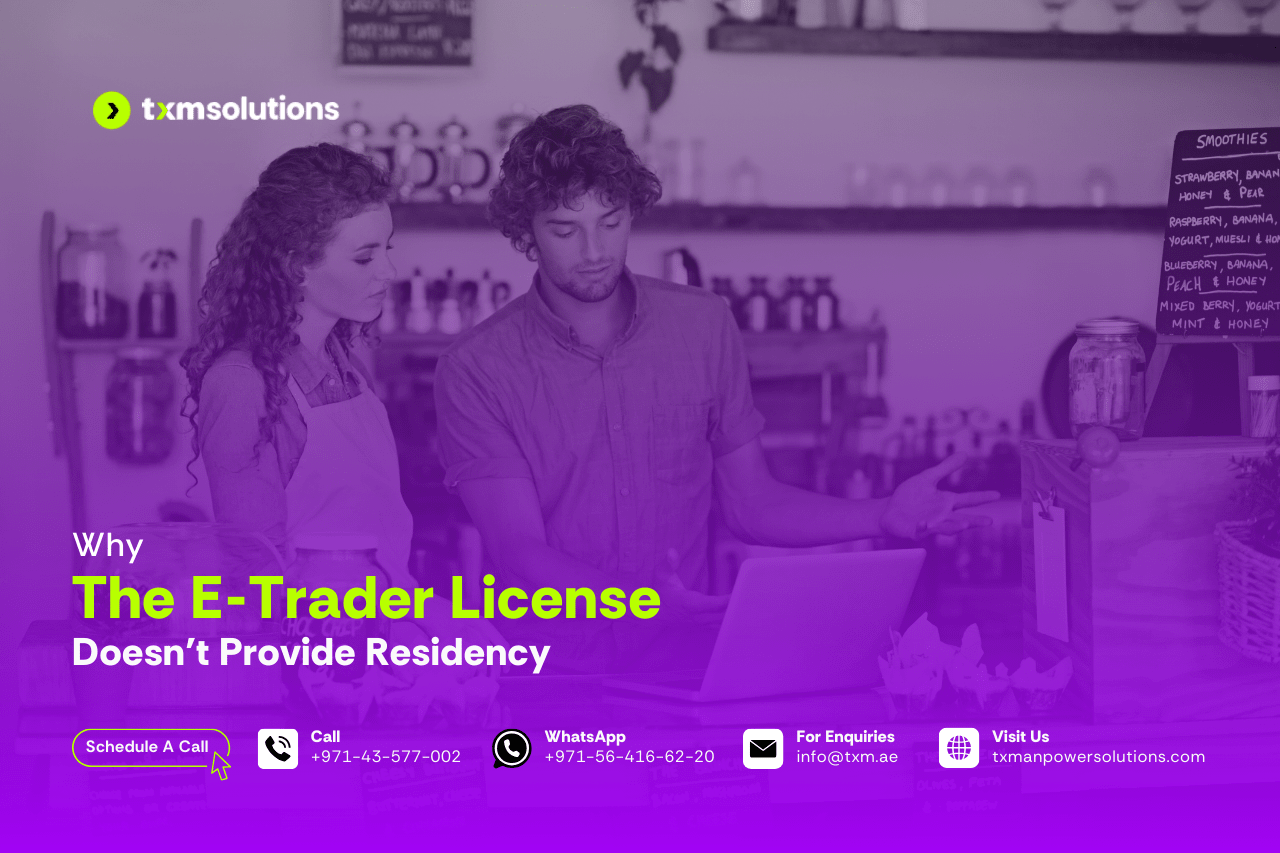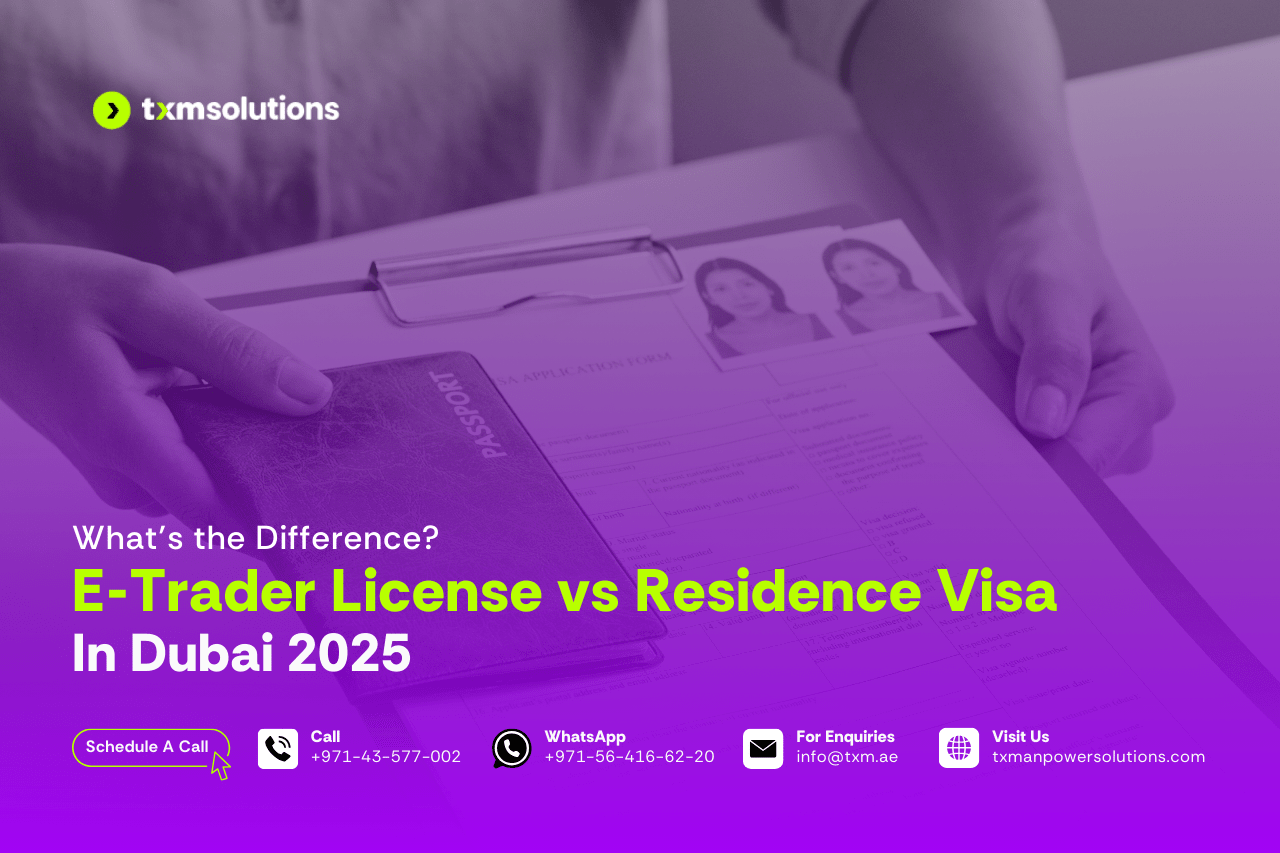The UAE continues to be a prime destination for global talent, offering a thriving business environment and an exceptional quality of life. Whether you are an employer looking to bring skilled professionals to the country or an individual seeking to further your career, understanding the process of securing UAE Employment Visa is essential.
This TXM Manpower Solutions visa services guide provides an in-depth look at how the employment visa process works, along with the requirements for both employers and employees, ensuring a smooth transition into one of the most dynamic regions in the world.
Table of Contents
ToggleWhat are UAE Employment Visa?
UAE Employment Visa are official permits that authorize foreign nationals to live and work in the UAE. These visa are typically sponsored by an employer and allow expatriates to engage in lawful employment within the country. The visa not only serves as a legal requirement but also opens doors to a wide range of benefits that significantly enhance both personal and professional life in the UAE.
Essential Requirements for UAE Employment Visa
Both the employer and employee must meet specific criteria when applying for a UAE Employment Visa. The following sections outline the key documents and processes involved.
Employee Requirements:
To apply for a UAE Employment Visa, employees need to provide the following:
- Personal Information: The employee must submit complete personal details, including name, nationality, age, and gender.
- Valid Passport: A copy of the passport with at least six months of validity remaining is required.
- Educational Qualifications: Certified copies of educational certificates, especially for jobs that require specialized skills.
- Photographs: Recent passport-sized photographs in compliance with UAE regulations.
- Medical Assessment: A medical examination to confirm the employee is in good health and free from communicable diseases.
- Health Insurance: Proof of health insurance, either provided by the employer or purchased independently.
Employer Requirements:
Employers must adhere to specific guidelines when sponsoring UAE Employment Visa for their employees. The following are the primary requirements for employers:
- Valid Business License: The employer must hold a valid license to operate within the UAE.
- Compliance with Labor Laws: The company must have no record of previous violations of UAE labor laws and regulations.
- Job Role Alignment: The offered job must align with the business activities registered under the company’s trade license.
- Entry Permit Application: Employers must apply for an entry permit from the Ministry of Human Resources and Emiratisation (MoHRE) to initiate the employment visa process for the employee.
Step-by-Step Guide to UAE Employment Visa
The process of obtaining a UAE Employment Visa is systematic and involves collaboration between the employer and the employee. Below is a detailed guide to help navigate the visa application efficiently.
Employer’s Role in the Process:
- Confirm the Job Offer: Ensure that the terms of employment, including job responsibilities, salary, and benefits, are clearly outlined in the employment contract.
- Submit Entry Permit Application: The employer submits an application for an entry permit on behalf of the employee through the MoHRE online portal.
- Provide Documentation: The employer must submit required documents such as educational certificates, passport copies, and the signed employment contract.
- Arrange Medical and Health Insurance: Employers are responsible for arranging the employee’s medical assessments and providing health insurance coverage, as mandated by UAE law.
Employee’s Role in the Process:
- Receive the Entry Permit: After the employer submits the application, the employee receives an entry permit, which allows them to enter the UAE.
- Enter the UAE: The employee travels to the UAE using the entry permit to begin the process of applying for the residence visa.
- Complete Residence Visa Application: The employee submits all necessary documents, including the employment contract, Emirates ID application, and health insurance details, to obtain a residence visa.
Processing Time:
With improvements in the efficiency of the UAE’s visa processing system, UAE Employment Visa can now be processed in as little as five days. This streamlined process ensures minimal delays, allowing employees to settle into their new roles more quickly.
Applying for a Dubai Employment Visa Online
Dubai has developed efficient online portals to facilitate the application for UAE Employment Visa, making the process faster and more convenient. Both employers and employees can track the progress of their applications online, ensuring a transparent and smooth process. Here’s how the process works:
Employer Responsibilities:
- Entry Permit Application: The employer initiates the visa process through the MoHRE portal, submitting the required documents such as educational certificates, passport copies, and the signed employment contract.
- Payment of Visa Fees: The employer covers the necessary visa processing fees, ensuring that the application moves forward smoothly.
Employee Responsibilities:
- Medical Examination: After the entry permit is issued, the employee must undergo a medical examination at an approved facility.
- Health Insurance: The employee must secure health insurance coverage, either through their employer or independently.
- Emirates ID: Once the employee has arrived in the UAE, they are required to register for an Emirates ID, which is mandatory for all UAE residents.
Final Steps:
The employer uses the entry permit, medical results, and Emirates ID details to apply for the residence visa, finalizing the employee’s legal status to live and work in the UAE.
Key Information about UAE Employment Visa
Employers act as sponsors for UAE Employment Visa, allowing employees to live and work in the UAE for a period of two to three years, depending on the specific visa type. The following documents are essential to the visa process:
- Medical test results confirming fitness for employment.
- A signed employment contract that outlines the employee’s role and compensation.
- An Emirates ID, which is required for all residents of the UAE.
- Proof of health insurance, in compliance with UAE law.
Expectations During the UAE Employment Visa Process
The UAE Employment Visa process is a collaborative effort that requires the active involvement of both the employer and the employee. The employer handles the administrative and legal processes, while the employee provides the necessary documents and undergoes the required medical assessments.
Once the application is submitted, the process typically takes a few weeks, though improvements in efficiency mean the process can sometimes be completed in as little as a few days.
Employer’s Role in UAE Employment Visa Processing
Employers are responsible for overseeing the entire UAE Employment Visa process. This includes submitting the initial entry permit application, managing the legal documentation, and ensuring the employee has completed their medical assessments and health insurance registration. Employers also act as liaisons with UAE authorities, ensuring the timely submission of all required paperwork.
Tracking Your UAE Employment Visa Application
Employees and employers can track the progress of their UAE Employment Visa application online through the UAE government portal. By entering the application number, users can see the current status of the visa and estimate when the process will be complete. This feature ensures transparency and provides peace of mind during the waiting period.
FAQs on UAE Employment Visa
Q1: What documents are required for a UAE employment visa?
A: You will need passport copies, passport-sized photographs, medical assessment reports, health insurance documentation, educational certificates, an employment contract, and an entry permit.
Q2: Can I change jobs with a UAE employment visa?
A: Yes, it is possible to change jobs while holding a UAE Employment Visa, provided you follow the legal procedure. This includes submitting an employment transfer application, obtaining a No Objection Certificate (NOC) from your current employer, and securing a new job offer from another employer.
Q3: What benefits come with a UAE employment visa?
A: Benefits include residency permits, medical assessments, Emirates ID registration, access to financial services, and health insurance coverage.
Q4: What types of visa are available in the UAE?
A: The UAE offers several visa types, including:
Multiple entry tourist visa
Visit visa
UAE Employment Visa
Golden visa
Property visa
Silver visa
Green visa
Freelancer visa
Conclusion
Securing UAE Employment Visa is a critical process for businesses looking to bring global talent to the UAE. With the country’s efficient and well-structured visa system, the process is straightforward and involves collaboration between both employers and employees.
The streamlined approach ensures that businesses can meet their staffing needs while offering expatriates the opportunity to work and live in one of the most advanced and dynamic regions in the world.
The UAE continues to be a highly attractive destination for professionals from around the globe. By understanding the UAE Employment Visa process and adhering to its requirements, both employers and employees can unlock the doors to a prosperous and fulfilling career in the UAE.




